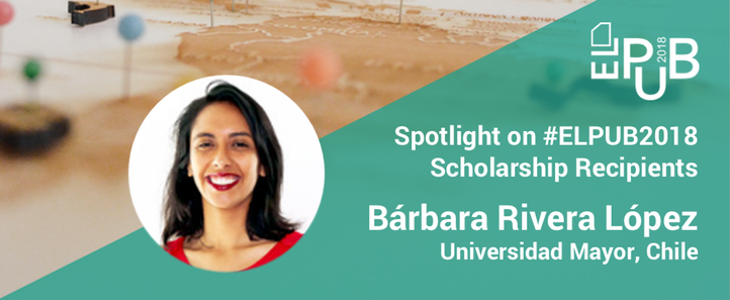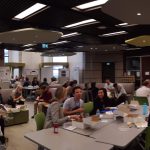
Over the next few weeks in the lead up to the ELPUB Conference, we will be featuring the #ELPUB2018 Travel Scholarship recipients on our blog. We would like to thank our Conference Partners – PLOS, OpenEdition, SPARC, FACETS Journal, UTSC’s Arts Culture and Media Department and Centre for Critical Development Studies, U of T Libraries, ACRL, Arcadia Fund, CARL, Creative Commons, eLife, KULA Journal and Ubiquity Press – for making it possible to include more voices in the conversation.
In this post, we share a Question and Answer interview with Bárbara Rivera López from Universidad Mayor, Chile. Bárbara will be presenting her poster, “Spatial Reference Patterns as a Point of Hegemonic Struggle: A case study of Biotechnology journals in Latin America” at the ELPUB Conference.
What are your research interests and how do they fit in with the theme of the ELPUB conference (Connecting the Knowledge Commons: From Projects to Sustainable Infrastructure)?
In order to answer this question it is necessary to share a piece of my personal history. Thanks to a scholarship from the Chilean government, I had the opportunity to study a Publishing Masters in the Global North. My origin was not seen as a source of diversity that could enrich the discussion; on the contrary it got in the way of achieving the ‘perfect’ English level or ‘fitting in’ the Global North publishing culture.
While trying to cope with my personal experience, my research interests shifted. I started to wonder about my position in the knowledge production system through the concepts of geopolitics of knowledge, English as a lingua franca of science, marginalization, inequality, Open Science (specifically, Open Access) and the position of Latin America in the global knowledge production landscape, among other topics.
My research interests fit into ELPUB 2018 because I understand the ethos and morality of Open Access as the base of an alternative to the current global publishing system. Even though there has been openwashing practices, Open Access (and Open Science) has allowed the academic community to start reflecting about its own practices, and regain ownership of the system.
In that context, I think that the discussion to be held in ELPUB 2018 is an opportunity to set the ground of a new publishing infrastructure, which is not driven by profits, but by the academic community interests.
What are some of the specific challenges within your region/country with regards to infrastructures for open access?
Regarding infrastructure, I believe that the SciELO program and network has already come a long way during its 20 years of existence in Latin America. SciELO network is a regional and community based project which is collaborative and diverse (it contains 14 different countries), and based on Open Access values.
Although I consider the SciELO programme and network as an example, it has the potential to constitute itself as a new publishing option for the current global publishing system. It is important to keep its original regional mission and not succumb to commercial pressures, and the culture of evaluation.
What do you hope are the outcomes of the ELPUB Conference?
The most concrete outcome will be to have a really global discussion on the current publishing system. Diversity in terms of stakeholders, format of presentations, topics and geographical origin of participants is going to enrich the conversation which is needed to understand the very complicated publishing practices.
Also, I would like to see Open Access’ sustainability and infrastructure problematized. These is going to generate valuable answers to construct the future of a more inclusive –and not just Northern- global Open Access movement.





